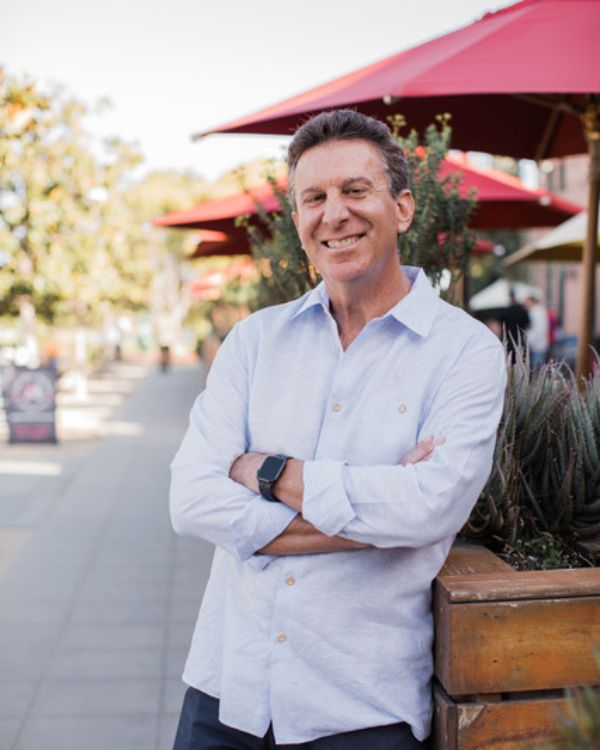Focus On What Matters with Mick Heyman
Do you focus on what matters when it comes to investing? Mick Heyman talks about the danger of chasing trends and how to find success!
Listen to us On
About the Episode
We focused on how to focus on what matters, why it’s important to tune out the noise, the price of poor investment decisions and the value to take away from them, why it’s short-sighted to chase trends, learning through story, and how to imagine your way to financial success, with Mick Heyman, CFA, Investment Counselor, Speaker, and Author.
Listen to hear a difference-making tip on why we’re a lot more similar than we are different!
You can learn more about Mick at MellowYourMoney.com, Instagram, and LinkedIn.
Get your copy of Mellow Your Money here:
Did you get anything out of this episode? Do us a solid and leave a review:
https://ratethispodcast.com/alignedmoneyshow
Learn more and engage at MoneyAlignmentAcademy.com, Twitter, LinkedIn, Instagram, YouTube and Facebook.
Buy George G a coffee (he loves coffee)
https://www.buymeacoffee.com/lifeblood
Have George G speak
https://moneyalignmentacademy.com/speaking/
Financial literacy and wellness for individuals, families, and companies
https://moneyalignmentacademy.com/
Find George G’s books here
The Aligned Money Show is the podcast for Money Alignment Academy, copyright 2024.

George Grombacher
Host

Mick Heyman
Guest
Episode Transcript
george grombacher 0:00
Alright, Mick to get us started. Give me two truths and a lie, please, sir,
Mick Heyman 0:07
I will do it. And but first, George, thanks for having me here. I’m excited to be on the show. And all right. So number one, I have served on one of the longest waves in the world, sometimes rent number one, sometimes eight or 10, but goes over a mile long. That’s number one. Number two is in 1988, I was named one of the top traders on the Chicago Board of Trade. And number three is I have a book that was published that was ranked number one on Amazon.
george grombacher 0:44
Holy cow, those are all very, very believable. You I know that you are a surfer? I know that you lived in Chicago, and I know that you are an author. So which one is it? Maybe you haven’t, maybe the first one is the lie the mile long wave.
Mick Heyman 1:02
Actually, I have been on that way. I did not make it the mile. My son did X night and it seemed to coma Peru. And it’s an amazing wave. And you just point your board to the left and off you go. And the geography is so strange. And I was able to get pretty far along it. But it is ranked i Some people say number one, sometimes it’s you know, eight or 10. But it’s a very, it’s a beautiful place to to go. So. So I have been on that wave. So what’s the lie, though it’s not a lie is if any, if they would have had an award for the worst trader in 1988. I had never traded on the Chicago Board of Trade. But I would have been closer to the worst and the best. I learned that trading is not my thing, when I tried to trade. And so it was actually a wonderful education for me to try to trade and be unsuccessful and realize it’s the long term. And so so. So there you go. You guide me. And by the way, just for full disclosure, my book ranking was number one for new releases on Amazon, in my category. And I think last for a day. That’s awesome. But I got a picture of it. Just just
george grombacher 2:37
proof proof. I love it. How long does it take to surf a mile long wave?
Mick Heyman 2:45
Several minutes. I mean it which, you know, in you were just in Solana Beach. So if you were surfing at all, you know, many waves can take you know, you’re up for three or four or five seconds. Right seems like several minutes. In fact, you’re so pumped up but this one yeah, it can it can take some minutes. That’s
george grombacher 3:07
that’s just got to be such a different experience. I mean, I’m sure that you’re becoming fatigued because you’re like, I can’t believe I’m still surfing.
Mick Heyman 3:13
Exactly. And it’s funny too, that we were at a boutique hotel that had a boat. And so the boat would pick you up at the at wherever you were and then drive you back to where you could start doing the wave again. You could keep going and going and going. Whereas the locals were telling us they serve two waves you because you had to walk them you had to walk a mile paddle out surf and then walk back them so two waves you were done.
george grombacher 3:49
That’s awesome. Well what is top of mind for you right now MC
Mick Heyman 3:55
I think one thing that you know it’s on top of mind to me and certainly clients that call me up is there’s there’s a constant excitement and and with with newsworthy events course right now it’s election related stuff. We we’ve had war issues not that long ago. Last year, we were panicked about what was the Fed going to do in the economy. And a year before that we thought inflation was heading back to the 1970s. And there’s this constant excitement of whatever the current news is. And so top of mind of me is trying to encourage whoever I can talk to, to put things in perspective. And the whole of that phrase, that wonderful phrase, this too shall pass it try to keep that on the front of your mind all the time. Because these are passing events. And believe me there will be a next thing. And the next thing after that If we get caught up too much on whatever the current theme is, we just have anxiety all the time. And particularly with investing, it’s not helpful. And it doesn’t mean, if you’re a political person jumping into politics I’ve been no, that’s not my gig. But, but I’m not saying don’t, you know, don’t participate and be passionate, but try to keep those that those passions away from your investments. That you know, in other words, if so, and so gets elected, it doesn’t mean you sell everything or buy everything. Or if you think that some policy is going to, you know, be promoted, we have plenty of examples where, you know, people five green energy stocks, were going to be fantastic. When this last administration got elected, well, they were for about, you know, a few months, and they were terrible. And so don’t over emphasize whatever is currently going on with your investing, and try to put in your mind that we want to focus on the long game.
george grombacher 6:10
I appreciate that. But it feels MC like this time, it’s really the worst time.
Mick Heyman 6:17
It does. And, and it constantly does feel like that though, I with a friend look back in history at other elections, you know, in the, in the 50s, you had McCarthyism. And where they’re literally calling out, you know, people, you know, movie movie stars and such, and for being communists, and it looked like the end of democracy, right? Or in the 30s, you had communism was with a real threat that, you know, it was a terrible time in our nation’s history for further, you know, the depression. And who knows, communism, that’s that’s how it took hold in many places. And so we faced these in and I’m not, you know, and you don’t need to pick sides, because either side in our political spectrum thinks the other one is going to destroy America. But that is not new. It but it feels new. And it feels that way. And but believe me, it felt that way to the people in the history, you know, and, and so I read a great book called sapiens. And he went back in the human history. And one of his one of his lines was, you know, back in the caveman days, there were these snotty teenagers making fun of their parents. And, you know, we think that this is different, you know, our kids are all on their phones. And, of course, the things are different, but our emotions are so similar. And so if we can have perspective in history, that it feels different, but so did it for our mothers, and grandmothers and fathers and our ancestors, that’s just life.
george grombacher 8:06
I guess it makes me feel better that that cave, people experiencing the same things that I’m experiencing with my, with my children,
Mick Heyman 8:13
human emotions do not change, you know, the offense to but yeah, so
george grombacher 8:22
separating the way that I feel about anything outside. With my investing, you said something that that really stuck with me talking about your experience trading, and it was an education. And I feel like, we all want to take a swing at beating the markets. And then when we do it, we get that education in the form of losing a little bit of money.
Mick Heyman 8:51
And that’s true. And, and I mean, that’s true in in investing and in our lives that we, you know, it’s our misadventures. That is, but isn’t our education. And there were, there was a great trader actually read his book. It was written by Jesse Livermore is published about 100 years ago. And he had, if you’ve, if you hit great quotes of the stock market, you’ll find him peppered throughout. One of his great quotes, though, I always thought is, he always looked at his mistakes as a tuition payment. And you can either you’re paying your tuition anyway, you just lost money, or you just fumbled this or that. You may as well take it as an education. Because if you don’t, you’re going to pay that tuition again. And again, and again. And so, and of course, we’ve all had that experience, too. I’m not saying that every mistake I’ve made. I’ve said okay, now I won’t make that again. You know, sometimes there’s a review class that needs to be repeated.
george grombacher 9:56
We do need a little bit of refresher
Mick Heyman 9:59
of that But I do think that if we can look at our lives and our investing as, as, as opportunities to learn, we can be a little more compassionate with ourselves, and also and take it as a lesson and not beat ourselves up. Now, with with my own trading, it was enough to say, that is not going to be my life’s work, you know, and I better find something that’s more fitting to my own personality. So
george grombacher 10:32
do you, how does that fit in? If somebody says, But I get what you’re saying, but I really want to be able to invest in stocks here and there. How do you reconcile all of that? I
Mick Heyman 10:45
think it’s perspective. You know, my one story I’ve told is, you know, as a little kid, I would hear my grandpa and my uncle argue, and my grandpa was more like me. You know, in golf, you’d say he was the guy that would hit the ball down the middle, keep it out of the woods, not hit it so far. And my uncle was the big swinger. And they would fight in my grandpa would say, I have a stock, I’m trimming it back, I want to make sure I’m not out of balance. And my uncle would say, That’s the dumbest thing I’ve ever heard. You either buy it or you sell it, you win big or you go home. And over time, I had great conversations, I tended to be more in my grandpa’s camp. But as I talked with my uncle, and he swung big, and he sometimes lost big, but what he learned was, in order to stay married to his to my aunt, that he had to put things in balance, that he had to have a part of his portfolio that was conservative, that was going to keep them together in his retirement, so they could stay retired. But he had to swing big, that was his thing. And so you know, when we say, you know, 50 to 60% of his portfolio, they were either in conservative stocks or cash or bonds, so that he knew that that was the steady part that was the long term part. And with the other part, he’d swing and, and he was willing to cut his losses, if things were against him, it took time to figure that out. But in the financial crisis, he had a lot of banks. But when they would cross different thresholds, he’d say, forget it, I’m moving on, I’m not going to ride this to the bottom. And the other thing was, he was willing to hold on, I would be more of the take the profit, keep things balanced. I think when he passed away, he still had that 60 70% In the conservative area. And then he had about 20% in Apple, because he never sold it. So so if you’re that kind of guy, make sure that it’s balanced enough. So you’re gonna meet your long term goal, but give yourself a chance to make some money. I’m not a cryptocurrency guy. And I’m not a fan. And I don’t understand it. But if somebody said to me, but I want to put a few $1,000 in it, and they’ve got plenty of money, why not? Give yourself some chances to make some money? Because that’s if that’s the type of person you are, you gotta respect that to
george grombacher 13:21
people who are earlier in their investing career, for lack of a better term, or their investing experience just getting started with investing. How do I know? How do I know what kind of investor I am? If I’m your grandpa or your uncle?
Mick Heyman 13:34
Well, I think part of it is to imagine bad things happening. I actually did that with a couple one time where they came in and they said, we’re really scared about the craps like 1929. In hindsight, I should have listened to them. Because three weeks later, a 1987, Black Monday happened and the market crashed. And so they were I don’t know how they predicted that, but I didn’t listen to them. But what I did do was say, well, listen, based on the amount of stocks you’ve got, if if the crash happened, this is the amount of money that it would declined to. Is that okay? What would you panic? And they looked at that, and at that point, they had 30, or 40%, in stocks, the rest in long bonds and cash. And so when the crash happened, and I called them up, and I said, Boy, I wish I would have listened to you said, Yeah, but guess what? And I told them what their portfolio was worth. It was exactly what we had projected. And they said, Well, okay, you said if that happened, we would just start buying. So they had strong hands. And we started buying at these low levels because they didn’t panic, because they had already imagined a worst case scenario. Long answer your question is, even at a long at a young age, it’s worthwhile to say what if out The Blue, something weird happens, you know, we’ve had it, you know, in the last, you know, 25 years, we’ve had 911, we’ve had the pandemic, we’ve had the financial crisis, these things happen. And guess what, we’re not going to predict them. And if we do happen to protect them, we probably won’t do the things that we need to do anyway. And so, imagine there is another thing out there, what would we do? And would we have strong hands with it. And for some young people, you’d say, Buy 100% in stocks, let it go be patient. But if you’re going to panic, and each person has to try to imagine that, imagine it’s your first $1,000. And, and you’re going to, hopefully, over a lifetime, invest hundreds of 1000s of dollars, maybe millions. But if you if you lose faith in stocks, because you’d lost a couple of $100, on that first 1000, imagine that the cost of long term with that’s gonna affect so I would even tell young kids, if you’re not comfortable, being 100% in stocks, don’t let some, you know, advisor tell you, that’s where you should be. Each person has to try to figure that out. And of course, if you make some mistakes along the way, that’s, again, treated as an education. Yeah,
george grombacher 16:16
I think that that’s great perspective. You could put together the greatest plan in the world that clicks all the checks all the boxes, but if somebody says, Well, if I do that, I’m going to get an ulcer, or I’m not going to be able to sleep, or it’s going to be so boring that I’m going to want more, it’s just not going to be the right fit.
Mick Heyman 16:34
That’s right. It’s, it’s in the end, I’ve heard you take stocks down to your sleeping level. And for each of us, that’s a different level, you know, there’s plenty of people that I’ve worked with that have 401, k’s and they put that money away every time and then they throw the statements away every month. And they say, I’m doing something bad, I’m not paying attention, I’m thinking, No, you’re doing a great thing. Just keep doing what you’re doing. Because they’re sticking to their plan. And they’re not. They’re not relating all these other words, that they’ve gotten their lives to their investments and investments. And I think in the end, they probably do better than the person who’s worried about it every other day. Appreciate it.
george grombacher 17:16
What, what inspired you to put pen to paper to become an author.
Mick Heyman 17:21
I think that it was partly thinking of these different experiences in my life and in the markets and, and thinking about how I learned about the markets was through my through stories, and how I learned about anything, it’s through, you know, listening to people’s stories. And so I wanted to create a book that was that was that that was explained the market through stories as opposed to a textbook or something like that. And make it fun. I happened to meet an editor who was had a, you know, just a comedic sense of humor. And I also wanted to make it fun and funny and readable. And during the pandemic, it was something that kept me busy. That end was a fun way of looking back at my life and thinking, what were the stories that really impacted me, that really has allowed me to have some success along the way.
george grombacher 18:19
And you’ve been at this for a little while. So I imagine it was probably harder than you thought to figure out which stories to include and which ones to leave out.
Mick Heyman 18:28
It really was, although there were a lot of fun, fond memories. And what the editor helped me do to was, you know, I used to tell the story of my first client in about a minute and a half. And she said, No, no, we want to learn about this eccentric lady and some of the weird funny things that she did along the way. And so getting drawn out more than the typical time allows me to reflect back at my life a lot more than I’ve done. So it was a it was a fun, almost therapeutic experience to
george grombacher 19:03
I don’t doubt it. So somebody picks the book up, what are you hoping that they get out of it?
Mick Heyman 19:10
I hope that they can realize that, first of all, knowing yourself is so important. And and then having a perspective at the market that is long term focuses on the long run. And if you can do that, it will take away the stress that so many people feel about investing. We don’t have to the current events may or may not stress us out, but you don’t have to apply it to your investments. You can make a plan follow the plan and and worry about other things in your life. You know, enjoy your kids and this and that but but we don’t have to, you know, watch the financial shows nonstop and worry about what they’re telling us. It doesn’t matter those people there don’t have any more ability to predict the future than than anyone else. I would recommend for people to listen to shows like yourself where you can actually learn long term concepts and, and, and things to help you whether it’s you know how to help you with your student loans and those kinds of things than worrying about which way the stock market’s gonna go. So, and hopefully through like fun stories that gives that perspective that over time we learn through our own stories. Each of us have our own stories. So learn from those and have some fun with it. And love it.
george grombacher 20:41
Well, MC, we are ready for your difference making tip, sir, what do you have for us?
Mick Heyman 20:47
I guess it’s not that different than what we’ve been talking about. But if we can remember that we even though we each have our own unique paths in life, that we have a lot in common. Each of us are struggling with different challenges and different lessons. And if we can be just, first of all compassionate with ourselves, that these lessons are there for us. And then if they appear out of the blue, it seems like but each of us has that unique ability to then learn from that, and then be compassionate with others. We’re all we’re all facing these things struggles. And so and how that affects the market is that if we can look at it that way with our investing to that, that each of us are trying to tap into what’s going on and have a little less, the whole FOMO the fear of missing out is a human emotion too. But stick to our stick to our guns stick to our own long term objectives and our own lessons that we need to learn. While I’m a long winded person, sorry about that.
george grombacher 21:57
I think that that is great stuff that definitely gets a Come on. It’s true. Feels like right now we are more apart than we’ve ever been. And maybe we are but the reality is, to your point were a lot more similar than we are different. So that’s true. Thanks so much for coming on. Where can people learn more about you? How can they engage? And where can where can they get their copy of mellow your money?
Mick Heyman 22:23
Well mellow your money is on Amazon. And and I believe Barnes and Noble and other sites, but Amazon’s probably the easiest. And the website is www dot Melo your money.com. And I’m open to any kind of communication. I’d love to talk to anybody. So Mick Atmel. Your money.com is my email and happy to communicate with anybody who feels like reaching out. Excellent.
george grombacher 22:51
Well, if you enjoyed this as much as I did show, make your appreciation. share today’s show with a friend who also appreciates good ideas, pick up your copy of mellow your money. Find that on Amazon wherever you buy your books, and then go to mellow your money.com learn a little bit more about Mick and what he’s working on and get in touch with them with your thoughts or certainly if you have questions about investing in and want to learn more about that. Thanks again, Nick.
Mick Heyman 23:17
Thank you, Joyce. Really, really appreciate the opportunity to be here.
george grombacher 23:21
Finally, a friendly reminder. It’s never going to be anybody more interested in your financial success than you are so act accordingly.
More Episodes
How You’ll Get There: Let Values Guide Your Path to Financial Success
On your path to get good at money, values are how you’ll get there. Values are what you believe to be of the greatest worth. The more we can incorporate our values into our decision-making process, the better off we’ll be. This is true for our personal...
Recognizing and Overcoming Limiting Financial Beliefs
We all have limiting beliefs. The child of billionaires could think, “There’s no way I'll ever be more financially successful than my parents.” The child of degenerates could think, “There’s no way I’ll ever amount to anything.” The important question for...
Live Below Your Means
Money is simple and straightforward. Here’s how you do it; spend less than you make and live below your means. But that appears to be impossible for most Americans. Three in five Americans are living paycheck-to-paycheck. 77% of us are anxious about money. ...
Don’t Put All Your Eggs in One Basket
With your personal finances, don’t put all your eggs in one basket. And the opposite is also true; don’t spread them out amongst too many. The idea is to find the proper amount of diversification that will help get you where you want to go, without too much...
Level Up Your Professional Skills for a Modern Workplace Pivot
Business and the modern workplace has changed thanks to the pandemic, and your professional evolution will need to keep pace. Investing in yourself and your skills will help you pivot to meet new opportunities as they arise. Level up your skills with these ideas from...
How to Stay Out of Debt
How to stay out of debt is one of the most important questions we can ask ourselves. This is because debt is a killer of dreams and a cause of limitless stress and anxiety, and a driving force behind the demise of relationships. Too harsh? I don’t think so. ...
Steps to Success with Your Money
There are steps to success for improving and getting better at anything and everything. It’s not always easy to figure out what the steps are, and once you know, you’ve still got to follow them. This is true for getting good at money. You’ve got to figure...
Overcoming Inaction
Inaction can afflict all of us. It presents itself in our very human desire to put things off. Humans are great at rationalizing inaction and procrastinating. The problem is, when we procrastinate, nothing happens. Nothing is created. And while individual...
Establishing a Safety Net for Your Small Business
As a small business owner, you know that one of the most important things you can do is protect your business. You've likely already taken some steps to do this, but it's never too late to reassess your risk and make sure you have a solid safety net in place. From the...
Join the show.
Interested in being on the show? Tell me a little bit more about you and what you’d like to talk about!














